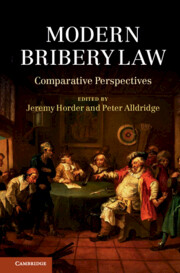Book contents
- Frontmatter
- Contents
- List of contributors
- Table of cases
- Table of statutes and international instruments
- Introduction
- Part I Bribery law: between public wrongdoing and private advantage-taking
- 1 Reformulating bribery: a legal critique of the Bribery Act 2010
- 2 Official and commercial bribery: should they be distinguished?
- 3 Countering corrupting conflicts of interest: the example of Hong Kong
- Part II Bribery without borders: tackling corruption in the EU and beyond
- Part III Ill-gotten gains: the challenge of prosecution, enforcement and asset recovery
- Bibliography
- Index
- References
3 - Countering corrupting conflicts of interest: the example of Hong Kong
from Part I - Bribery law: between public wrongdoing and private advantage-taking
Published online by Cambridge University Press: 05 May 2013
- Frontmatter
- Contents
- List of contributors
- Table of cases
- Table of statutes and international instruments
- Introduction
- Part I Bribery law: between public wrongdoing and private advantage-taking
- 1 Reformulating bribery: a legal critique of the Bribery Act 2010
- 2 Official and commercial bribery: should they be distinguished?
- 3 Countering corrupting conflicts of interest: the example of Hong Kong
- Part II Bribery without borders: tackling corruption in the EU and beyond
- Part III Ill-gotten gains: the challenge of prosecution, enforcement and asset recovery
- Bibliography
- Index
- References
Summary
Introduction
This chapter views corruption as arising from a conflict of interests, in which the corrupt actor pursues a private interest at the expense of an official or professional duty. In this way, conflicts of interest are at the root of corrupt behaviour in both the public and the private sector. Such conflicts can be countered by structural strategies that subject the agent to limited discretion, increased supervision or transparency. An independent anti-corruption agency is a powerful check of this type. Conflicts of interest can also be combated by increasing the cost of pursuing the private interest, whether that cost be monetary or in the form of a loss of freedom or reputation. Increasing the probability that such cost will be incurred augments the deterrent factor, and thus the quality of oversight, investigation and prosecution will increase the cost of corruption to potential actors and reduce the frequency of its occurrence. The Hong Kong anti-corruption regime combines all of these techniques in exemplary fashion. This chapter uses the example of Hong Kong to analyse how corrupting conflicts of interest can be countered through law and related programmes.
Conflicts of interest and corruption
The undesirable acts referred to with the term ‘corruption’ display conflicts of interest at their core. Organisations like governments and corporations operate by delegating the governing power of collective citizens, owners or their respective leaders to managing agents, whether these be ministers, directors, officials or officers. The organisation thus becomes a network of delegated duties and assigned rights, whether of principals and agents, fiduciaries and beneficiaries or some less well-defined relationship of trust and reliance. These ‘delegations’ of power usually exist without a formal agency relationship, as in the type of fiduciary duties that corporate directors owe to shareholders, or the type of behaviour that investors legitimately expect from the ‘gate-keeping’ rating agencies trusted to rate the safety of investment products. When exercising delegated power, every agent has a duty to his principal, whether such principal be the state, its citizens or a private employer. When the person charged with such a duty breaches it by serving a private, conflicting interest, the system built on delegated power and trust runs amok, no longer serving the ends for which it was designed, but organically disparate and even conflicting ends.
- Type
- Chapter
- Information
- Modern Bribery LawComparative Perspectives, pp. 66 - 94Publisher: Cambridge University PressPrint publication year: 2013
References
- 2
- Cited by



